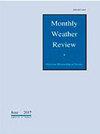The Histories of well-documented Maritime Cyclones as Portrayed by an Automated Tracking Method
IF 3
3区 地球科学
Q3 METEOROLOGY & ATMOSPHERIC SCIENCES
引用次数: 1
Abstract
This study examines extratropical cyclone tracks, central pressure, and maximum intensification rates from a widely used automated cyclone tracking scheme and compares them to the manual tracking of five well-known North Atlantic cyclones whose histories are available in the refereed literature. The automated tracking scheme is applied to sea level pressure data from four different reanalyses of varying levels of sophistication to test the sensitivity of the results to input data resolution and quality. Further, we test the tracking scheme using lower-tropospheric vorticity obtained from the most recent reanalysis (ERA5) for four of these cyclone events. Substantial discrepancies in cyclone position, intensity, and maximum intensification rates exist between the manual tracking and the automated tracking and are not eliminated by using higher resolution reanalyses or by “turning off” the spatial smoothing feature of the automated tracking scheme (needed to reduce spurious cyclone detections). The results point to a particular problem in detecting weaker and earlier stage cyclones and confirm findings from studies that have examined a broad range of cyclone tracking schemes for a range of reanalyses. Notably, this early cyclone stage often involves a smaller-scale secondary cyclogenesis or cyclone wave, which are detected by the automated scheme only after subsequent growth in the ensuing 6–12 hours. It is known that these early stages are critical for a comprehensive understanding of rapid intensification events. A discussion of possible future solutions to this problem is presented.用自动跟踪方法描绘的有充分记录的海上旋风的历史
这项研究从一个广泛使用的自动气旋跟踪方案中检查了温带气旋的路径、中心压力和最大增强率,并将其与五个著名北大西洋气旋的手动跟踪进行了比较,这些气旋的历史可在参考文献中查到。将自动跟踪方案应用于来自四种不同复杂程度的重新分析的海平面压力数据,以测试结果对输入数据分辨率和质量的敏感性。此外,我们使用从最近的再分析(ERA5)中获得的低对流层涡度对其中四个气旋事件的跟踪方案进行了测试。手动跟踪和自动跟踪在气旋位置、强度和最大增强率方面存在显著差异,并且无法通过使用更高分辨率的重新分析或“关闭”自动跟踪方案的空间平滑功能(需要减少虚假气旋检测)来消除。研究结果指出了探测较弱和早期气旋的一个特殊问题,并证实了研究结果,这些研究对一系列重新分析的广泛气旋跟踪方案进行了检查。值得注意的是,这一早期气旋阶段通常涉及较小规模的二次气旋形成或气旋波,只有在随后的6-12小时内生长后,自动方案才能检测到。众所周知,这些早期阶段对于全面了解快速强化事件至关重要。对这个问题未来可能的解决方案进行了讨论。
本文章由计算机程序翻译,如有差异,请以英文原文为准。
求助全文
约1分钟内获得全文
求助全文
来源期刊

Monthly Weather Review
地学-气象与大气科学
CiteScore
6.40
自引率
12.50%
发文量
186
审稿时长
3-6 weeks
期刊介绍:
Monthly Weather Review (MWR) (ISSN: 0027-0644; eISSN: 1520-0493) publishes research relevant to the analysis and prediction of observed atmospheric circulations and physics, including technique development, data assimilation, model validation, and relevant case studies. This research includes numerical and data assimilation techniques that apply to the atmosphere and/or ocean environments. MWR also addresses phenomena having seasonal and subseasonal time scales.
 求助内容:
求助内容: 应助结果提醒方式:
应助结果提醒方式:


